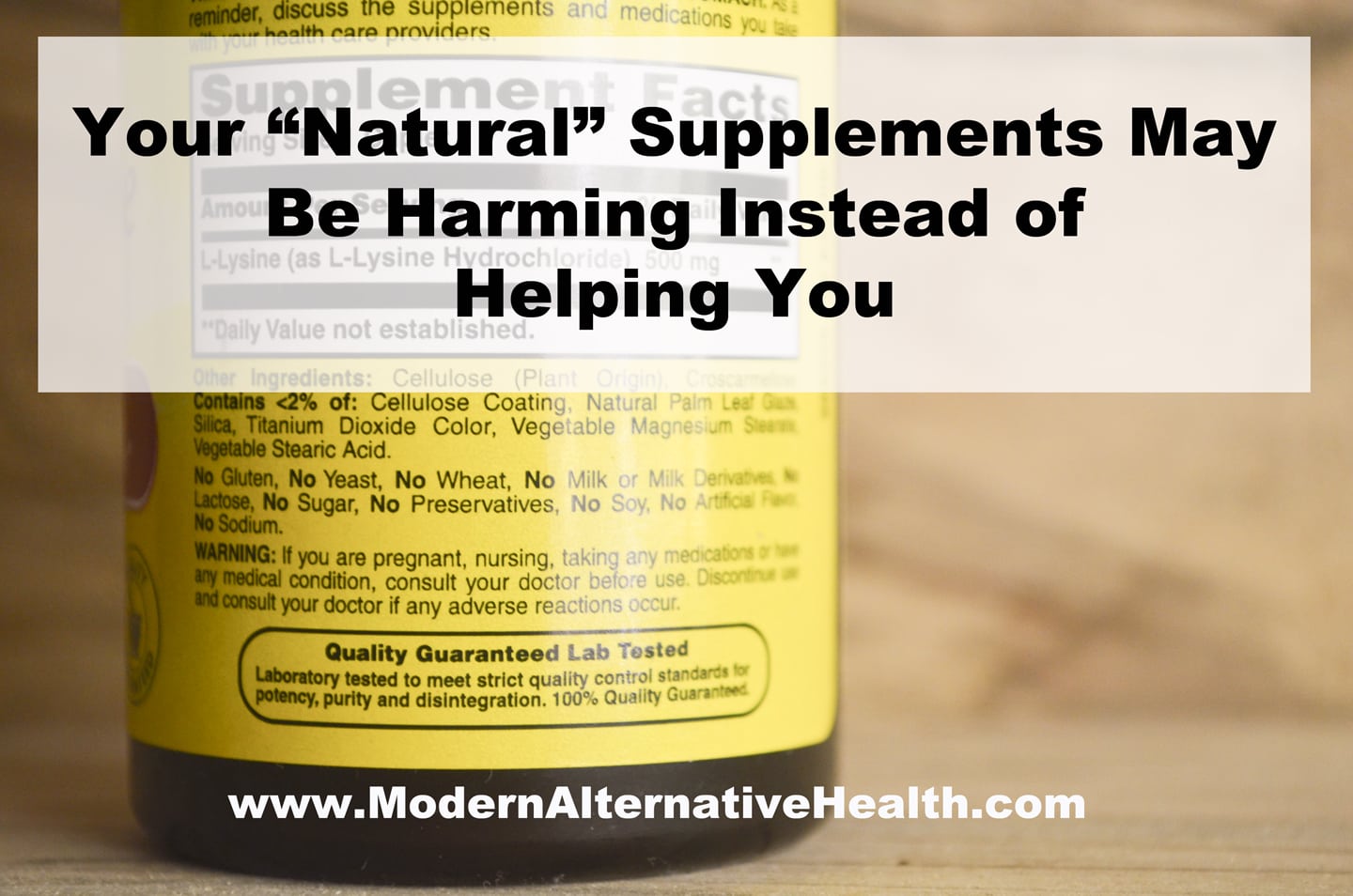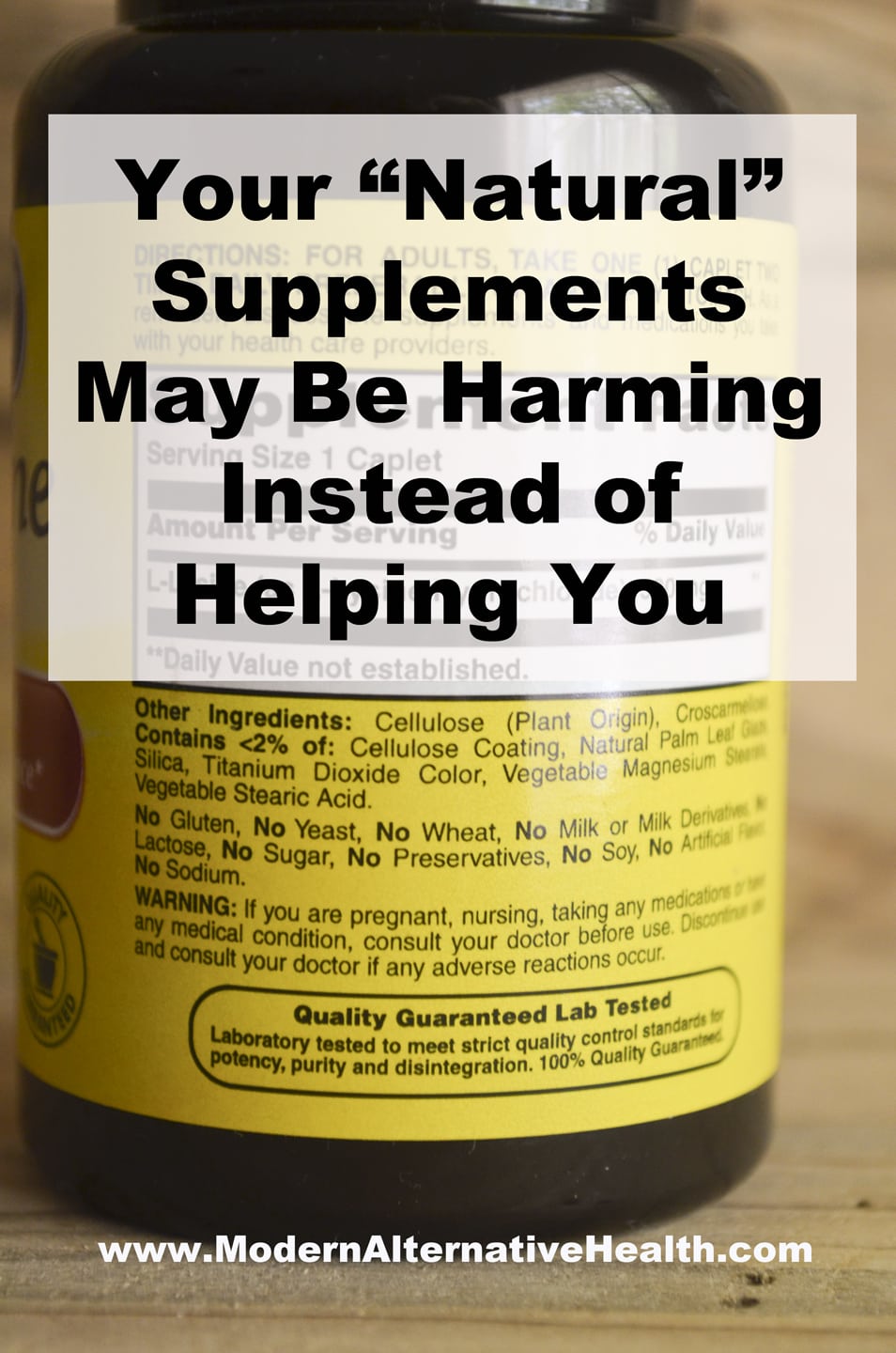
By Angela Montgomery, Contributing Writer
You may be thinking that you are helping yourself be more healthy because of the natural supplements you are taking. But, did you know that even natural supplements could be causing you more harm than good because of the ingredients?
I know it sounds crazy, but it is true. The majority of the supplement industry doesn’t want you to look at the ingredient list on the back of the bottle. They only want you to read the title of their product, maybe the tag line and then buy it! Sometimes we do look but assume that everything must be safe. Oftentimes there are words in the ingredient list that we have never heard of and have no idea what they really are. Why are they even there? Why can’t the ingredients be ONLY the particular vitamin, mineral, etc that we are wanting?
Your Natural Supplements May Be Harming Instead of Helping You
I know that many of you who read this blog or ones similar are well informed health product consumers. But, many times, people get advice from friends and family, or read a blurb online about the latest health transforming “natural” vitamin/herb/mineral/supplement. Then, they run out to the nearest discount store and purchase the said supplement for themselves, hoping that the same benefits will come to them. What many people don’t realize is that many of the well known discount store supplements have ingredients added to them to make them less costly to produce and in turn less costly for the consumer. This does makes access to supplements easier for the general population, but it comes with a higher health cost which is the very thing you are trying to improve! What is a health savvy consumer to do? Be informed, read labels and do research.
Years ago when I first started my journey of natural health I was concerned with ingredients and what they were. I found a small book that I have referenced many times since then. It is small enough to carry around with you so you can look up an ingredient on the fly. The title is Food Additives: A Shopper’s Guide To What’s Safe & What’s Not. The information below is taken from this book.
Checking the Ingredients
Here are few ingredients to look out for (There are many more, but we will only touch on a few in this post):
Maltodextrin
Commonly used in powdery things such as shake mixes, drink mixes and other powdered supplement forms. If you are trying to avoid GMO’s and you are consuming something with this ingredient, think again! You are very likely consuming GMO corn unless the Maltodextrin is specifically organic/gmo free.
From the Food Additives Shopper’s Guide:
Maltodextrin: a sugar, may be corn based; may contain free glutamates. Flavor enhancer, texturizer. Caution is advised. The additive may be unsafe, poorly tested, or used in foods we eat too much of. The additive may cause allergic reactions.
What Are Free Glutamates?
An ingredient that may cause brain damage, especially in children, free glutamates are always found in:
autolyzed yeast
calcium caseinate,
gelatin
hydrolyzed corn gluten
hydrolyzed protein
hydrolyzed soy protein
monopotassium glutamate
monosodium glutamate (MSG)
pea protein
plant protein extract
sodium caseinate
textured protein
yeast extract, yeast food and yeast nutrient
When I first read the list of “always found in” foods, alarm bells and surprise occurred!
My first thoughts were, ‘Gelatin! I thought a lot of people purposelessly take gelatin as a supplement! They do… Aren’t some capsules made of gelatin? They are…’ My next thought was, ‘Pea protein!! Isn’t this one of the main ingredients in most vegan protein shakes? Yes…’
What should you do to avoid maltodextrin and free glutamates? Look for products that are grass-fed, organic and non-gmo.
What About Children’s Supplements?
I went to a popular online vitamin store website and looked in the children’s section. I then searched by top selling. The first couple of the top selling items I looked at were fairly good, but the in house, website brand was one of the worst, and one of the lowest cost. It looks appealing with the shiny, fun image on the package, and they’d like you to think it would be beneficial to your child. Another way they market to you is by stocking products that truly do have good ingredients (some by other companies, some by their brand). That causes you to believe that if they sell these higher cost, better brands with good ingredients, then their own in house brand must be ok AND it costs less! When you look at the label, everything seems to be in order but then you look at the OTHER ingredients found at the bottom in small print and that is when it goes downhill.
Here is the list of a few of “other” ingredients found in a natural childrens multivitamin:
glucose syrup
sucrose
gelatin
colors added (black carrot juice concentrate, maqui berry juice concentrate, annatto)
natural flavors
fractionated coconut oil (may contain one or more of the following: carnauba wax, beeswax)
citric acid
lactic acid

Let’s look at the first two ingredients listed here:
Glucose syrup
From the trusty Food Additives Shopper’s Guide: “Caution is advised. The additive may be unsafe, poorly tested, or used in foods we eat too much of. The additive may cause allergic reactions. May be corn based [GMO’s!!]; associated with blood sugar problems, depression, fatigue, B-vitamin deficiency, hyperactivity, tooth decay, periodontal disease, indigestion.”
Sucrose
From Food Additives Shopper’s Guide: “Caution is advised. The additive may be unsafe, poorly tested, or used in foods we eat too much of. Sweetener used in processed foods. Associated with blood sugar problems, depression, fatigue, B-vitamin deficiency, hyperactivity, tooth decay, periodontal disease, indigestion.”
I am sensing a theme here.
These “sweeteners” are commonly used in products for children because they want to help them “taste better”. This is even found in the products that you may think are “higher end” and from some of the more reputable natural companies.
What strikes me as so tragic and ironic is that these are used in children’s products and cause the very problems we are trying to avoid and prevent by giving our children the supplements in the first place!
Why are these extra ingredients added? Usually it is a way to increase the fill or size of the product while also cutting the manufacturing cost. Unfortunately this also reduces the quality and potency of the product. And, it comes with a whole host of other potential problems! The additives sometimes also help the products be more palatable to the taste and to the eyes with added sweeteners and added colors.
What Should You Do?
- Look for Organic, Non-GMO products.
- Also, be on the lookout for products that are ONLY what they say they are. For example, if you are looking for a Spirulina powder, check the ingredients to be sure that that is the ONLY ingredient, or that it is the main one among other whole food ingredients.
- Skip even the natural supplements if they have a long list of words that you aren’t sure what they mean. Look for whole food ingredients. If you shop online, you can find the ingredient list. If it isn’t listed on the website you are shopping from, a quick online search will usually bring it up.
- Don’t go by testimonials and buy something blindly. Do your research.
- Make your own


I use pure, powdered forms by preference. I can then add to a shake or juice, in a dose that is appropriate to me. I mainly do this to avoid magnesium stearate capsules – it’s not something you want to be ingesting.